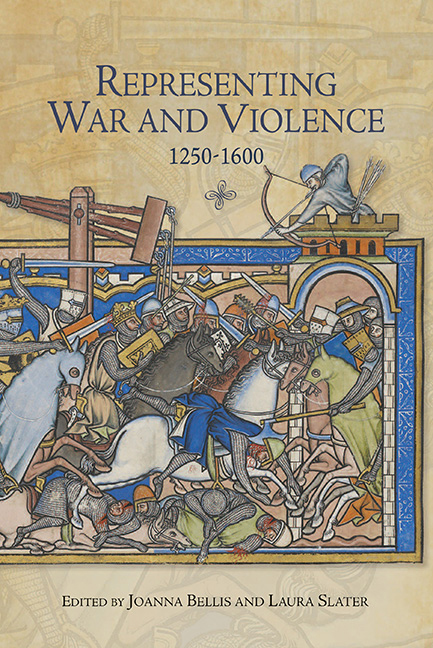Book contents
- Frontmatter
- Contents
- List of Illustrations
- Acknowledgements
- List of Contributors
- Introduction: ‘Representation’ and Medieval Mediations of Violence
- Part I The Ethics and Aesthetics of Depicting War and Violence
- Part II Debating and Narrating Violence
- Part III Experiencing, Representing and Remembering Violence
- 7 Representing War and Conquest, 1415–1429: the Evidence of College of Arms Manuscript M9
- 8 Tudor Soldier-Authors and the Art of Military Autobiography
- 9 Three Narratives of the Fall of Calais in 1558: Explaining Defeat in Tudor England
- Bibliography
- Index
9 - Three Narratives of the Fall of Calais in 1558: Explaining Defeat in Tudor England
from Part III - Experiencing, Representing and Remembering Violence
Published online by Cambridge University Press: 05 September 2016
- Frontmatter
- Contents
- List of Illustrations
- Acknowledgements
- List of Contributors
- Introduction: ‘Representation’ and Medieval Mediations of Violence
- Part I The Ethics and Aesthetics of Depicting War and Violence
- Part II Debating and Narrating Violence
- Part III Experiencing, Representing and Remembering Violence
- 7 Representing War and Conquest, 1415–1429: the Evidence of College of Arms Manuscript M9
- 8 Tudor Soldier-Authors and the Art of Military Autobiography
- 9 Three Narratives of the Fall of Calais in 1558: Explaining Defeat in Tudor England
- Bibliography
- Index
Summary
The fall of the English-held Calais to the French in January 1558 was a defining moment in Tudor history. It was also one of the worst military defeats suffered by English arms on the Continent between the end of the Hundred Years War and the debacle at Dunkirk in 1940. In the half century or so that followed the event, the fall of Calais provided ample material for English and French historians, poets, polemicists and students of war to represent various aspects of warfare. In this article I want to examine three themes that emerge in that body of writing. During the second half of the sixteenth century, English narratives concerning the fall of Calais moved from recrimination and accusations of treachery, through a celebration of martial and chivalric endeavour, to representing more objective, ‘rational’ explanations of military defeat. Together they illustrate how the English reacted to the town's fall, how their explanations of defeat related to wider, contemporary political issues, and how, even amidst the ignominy of January 1558, they discovered aspects of the campaign to be proud of. The various narratives are important too as they reveal changing attitudes towards war and its representation in literature, and developments in the writing of military history in Elizabethan England against the backdrop of broader cultural changes in both warfare and the writing of history.
Before looking at the literary responses to the fall of Calais in 1558, it is worth providing some background. The town, and its surrounding area (known as the ‘Pale’), had been captured by Edward III in 1347 after a siege of some eleven months’ duration. The English king, having rather theatrically pardoned its leading townsmen, expelled the French population and resettled Calais as a ‘little piece of England overseas’. The town was protected by a medieval high-walled castle, as well as a fortress in the harbour (Rysbank Tower), and a number of outlying fortresses, the most notable of which was at Guînes. These various fortresses had undergone significant rebuilding, modernising them to accommodate larger numbers of gunpowder weapons, during the reign of Henry VIII and Edward VI. Since the mid-fourteenth century Calais had played host to a permanent garrison of some one thousand men, supported by the profits of the English wool trade.
- Type
- Chapter
- Information
- Representing War and Violence, 1250-1600 , pp. 178 - 190Publisher: Boydell & BrewerPrint publication year: 2016



